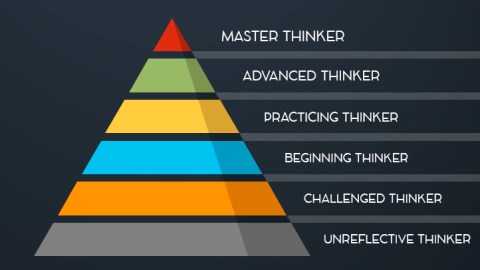How to think effectively: Six stages of critical thinking

Credit: Elder / Paul
- Researchers propose six levels of critical thinkers: Unreflective thinkers, Challenged thinkers, Beginning thinkers, Practicing thinkers, Advanced thinkers, and Master thinkers.
- The framework comes from educational psychologists Linda Elder and Richard Paul.
- Teaching critical thinking skills is a crucial challenge in our times.
The coronavirus has not only decimated our populations, its spread has also attacked the very nature of truth and stoked inherent tensions between many different groups of people, both at local and international levels. Spawning widespread conspiracy theories and obfuscation by governments, the virus has also been a vivid demonstration of the need for teaching critical thinking skills necessary to survive in the 21st century. The stage theory of critical thinking development, devised by psychologists Linda Elder and Richard Paul, can help us gauge the sophistication of our current mental approaches and provides a roadmap to the thinking of others.
The researchers identified six predictable levels of critical thinkers, from ones lower in depth and effort to the advanced mind-masters, who are always steps ahead.
As the scientists write, moving up on this pyramid of thinking “is dependent upon a necessary level of commitment on the part of an individual to develop as a critical thinker.” Using your mind more effectively is not automatic and “is unlikely to take place “subconsciously.” In other words – you have to put in the work and keep doing it, or you’ll lose the faculty.
Here’s how the stages of intellectual development break down:
Unreflective thinker
These are people who don’t reflect about thinking and the effect it has on their lives. As such, they form opinions and make decisions based on prejudices and misconceptions while their thinking doesn’t improve.
Unreflective thinkers lack crucial skills that would allow them to parse their thought processes. They also do not apply standards like accuracy, relevance, precision, and logic in a consistent fashion.
How many such people are out there? You probably can guess based on social media comments. As Elder and Paul write, “it is perfectly possible for students to graduate from high school, or even college, and still be largely unreflective thinkers.”
Challenged thinker
This next level up thinker has awareness of the importance of thinking on their existence and knows that deficiencies in thinking can bring about major issues. As the psychologists explain, to solve a problem, you must first admit you have one.
People at this intellectual stage begin to understand that “high quality thinking requires deliberate reflective thinking about thinking”, and can acknowledge that their own mental processes might have many flaws. They might not be able to identify all the flaws, however.
A challenged thinker may have a sense that solid thinking involves navigating assumptions, inferences, and points of view, but only on an initial level. They may also be able to spot some instances of their own self-deception. The true difficulty for thinkers of this category is in not “believing that their thinking is better than it actually is, making it more difficult to recognize the problems inherent in poor thinking,” explain the researchers.
Thinkers at this level can go beyond the nascent intellectual humility and actively look to take control of their thinking across areas of their lives. They know that their own thinking can have blind spots and other problems and take steps to address those, but in a limited capacity.
Beginning thinker
Beginning thinkers place more value in reason, becoming self-aware in their thoughts. They may also be able to start looking at the concepts and biases underlying their ideas. Additionally, such thinkers develop higher internal standards of clarity, accuracy and logic, realizing that their ego plays a key role in their decisions.
Another big aspect that differentiates this stronger thinker – some ability to take criticism of their mental approach, even though they still have work to do and might lack clear enough solutions to the issues they spot.
Practicing thinker
This more experienced kind of thinker not only appreciates their own deficiencies, but has skills to deal with them. A thinker of this level will practice better thinking habits and will analyze their mental processes with regularity.
While they might be able to express their mind’s strengths and weaknesses, as a negative, practicing thinkers might still not have a systematic way of gaining insight into their thoughts and can fall prey to egocentric and self-deceptive reasoning.
How do you get to this stage? An important trait to gain, say the psychologists, is “intellectual perseverance.” This quality can provide “the impetus for developing a realistic plan for systematic practice (with a view to taking greater command of one’s thinking).”
“We must teach in such a way that students come to understand the power in knowing that whenever humans reason, they have no choice but to use certain predictable structures of thought: that thinking is inevitably driven by the questions, that we seek answers to questions for some purpose, that to answer questions, we need information, that to use information we must interpret it (i.e., by making inferences), and that our inferences, in turn, are based on assumptions, and have implications, all of which involves ideas or concepts within some point of view,” explain Elder and Paul.
One doesn’t typically get to this stage until college and beyond, estimate the scientists. This higher-level thinker would have strong habits that would allow them to analyze their thinking with insight about different areas of life. They would be fair-minded and able to spot the prejudicial aspects in the points of view of others and their own understanding.
While they’d have a good handle on the role of their ego in the idea flow, such thinkers might still not be able to grasp all the influences that affect their mentality.
Advanced thinker
The advanced thinker is at ease with self-critique and does so systematically, looking to improve. Among key traits required for this level are “intellectual insight” to develop new thought habits, “intellectual integrity” to “recognize areas of inconsistency and contradiction in one’s life,” intellectual empathy” to put oneself in the place of others in order to genuinely understand them, and the “intellectual courage” to confront ideas and beliefs they don’t necessarily believe in and have negative emotions towards.
Master thinker
This is the super-thinker, the one who is totally in control of how they process information and make decisions. Such people constantly seek to improve their thought skills, and through experience “regularly raise their thinking to the level of conscious realization.”
A master thinker achieves great insights into deep mental levels, strongly committed to being fair and gaining control over their own egocentrism.
Such a high-level thinker also exhibits superior practical knowledge and insight, always re-examining their assumptions for weaknesses, logic, and biases.
And, of course, a master thinker wouldn’t get upset with being intellectually confronted and spends a considerable amount of time analyzing their own responses.
“Why is this so important? Precisely because the human mind, left to its own, pursues that which is immediately easy, that which is comfortable, and that which serves its selfish interests. At the same time, it naturally resists that which is difficult to understand, that which involves complexity, that which requires entering the thinking and predicaments of others,” write the researchers.
So how do you become a master thinker? The psychologists think most students will never get there. But a lifetime of practicing the best intellectual traits can get you to that point when “people of good sense seek out master thinkers, for they recognize and value the ability of master thinkers to think through complex issues with judgment and insight.”
The significance of critical thinking in our daily lives, especially in these confusing times, so rife with quick and often-misleading information, cannot be overstated. The decisions we make today can truly be life and death.





